|
July 16, 2016 - No. 29
All Out to
Oppose the
United States of North American
Monopolies and Its Program for War!
U.S. President's
Warmongering Address
to Joint Houses of Parliament
- Enver Villamizar
-

Protest at North American leaders summit, Ottawa, June 29,
2016.
• Dangerous
New Measures Tabled in
Parliament
RIMPAC 2016 Naval
Exercises
• Canada's Participation in
Massive U.S.-Led War Games
in the Pacific
U.S. War Preparations
on
Korean Peninsula
• Support the Korean People's
Opposition to U.S. Missile Defence System in South Korea!
- Philip Fernandez -
• Koreans Militantly Oppose Anti-Missile System
• Nefarious "Theory of North Korean
Threat"
No to
Mexican State Terrorism and Criminalization of Resistance!
• Peoples'
Human Rights Observatory Calls for
Dialogue with Teachers
• Letter to Organizations in
Canada
- Peoples' Human Rights Observatory -
Venezuela Fights Back
Against
U.S. Imperialist-Inspired Counter-Revolution
• Workers Take Back Factory from
U.S. Company After 1,000 Layoffs
• Special Report: Hunger in
Venezuela? A Look Beyond the Spin
- Christina Schiavoni and William Camacaro, Food
First -
• Reports of Attacks Against Food
Distribution Trucks
Increase in Venezuela
- Jeanette Charles -
• Note to Our Readers
Supplement
80th Anniversary of the Spanish Civil War
• Long Live the Memory of the
Anti-Fascist Resistance in Spain
All Out to Oppose the
United States of
North
American Monopolies and Its Program for War!
U.S. President's Warmongering Address to
Joint Houses
of
Parliament
- Enver Villamizar -

On June 29, U.S. President Barack Obama addressed a
joint sitting of Parliament in the Canadian House of Commons following
the end of the North American Leaders' Summit that day. Obama's speech
comes in the twilight of his eight-year Presidency, at a time when U.S.
society is mired more deeply than ever in a social crisis, with young
black
men and other sections of the people being killed with impunity by
police while the U.S. is engaged in more wars and conflicts than ever.
It also comes in the midst of the U.S. election campaign where the
stated aim has become to "unite the nation" behind a war president
capable of "Making America Great Again."
Despite the conditions facing the United States itself
and
the resistance of the peoples worldwide to its imposition through
force of the neo-liberal program of the monopolies, Obama used
the opportunity to present an image of himself as an
elder statesman passing the torch of what is called "progressive
values" to a younger Trudeau. CBC correspondent Murray Brewster
put it this way: "U.S. President Barack Obama handed the torch of
progressive politics to Prime Minister Justin Trudeau Wednesday
in a warm, rousing speech to Parliament, in which he also bluntly
urged Canada to spend more on defence to meet its international
obligations."

In his remarks Obama laid out a program for the United
States of North American Monopolies and Canada's position within it
which has already been worked out secretly behind closed doors between
various officials of the two executives. In the arrangement, Canada as
a servile entity is being given its new marching orders by the U.S. In
this arrangement Trudeau is being hailed by Obama as a fitting
successor to himself on the question of "rights" and so-called
progressive values so as to disarm the people's movements, especially
as concerns matters of war and peace in both countries. The speech laid
the groundwork for a new arrangement for the United States of North
American Monopolies in which Trudeau serves as the velvet glove
covering the iron fist of neo-liberalism and war of the U.S.
imperialists headed by the intended war President Hillary Clinton.
Obama came to Canada to lay out for Canadians the role the country is
to play in the service of U.S. imperialism's striving to maintain its
dominant position and suppress any independent movement of the peoples
for the New.
It is nonetheless disgusting to see a war president of
Obama's calibre, who has authorized drone warfare and a policy of
targeted assassinations in lieu of providing problems with political
solutions, receive a sustained standing ovation and cheers when he
entered the House of Commons to address the joint session of the Houses
of Parliament and special invited guests. During his speech he
went on to receive some twenty more standing ovations from all parties
and guests. Even after he finished, shouts of "Four more years!"
resounded through the House.
In this writer's opinion, it is reminiscent of the time when Hitler
marched into Austria in the Anschluss of 1938 with the Nazi-installed
head of the Austrian government welcoming him and his occupying army
with open arms, voluntarily lifting the border gates to the Nazi army
and in so doing offering up the country, its natural and human
resources, territory and military to the Nazi war machine. This was a
prelude to invasions and occupations of other lands and World War Two.
Talk of "Shared Values"
Obama's speech was riddled with references to shared
U.S. and Canadian values, which he presented as universal, much like
Trudeau's assertion that there is no core Canadian identity, just a set
of shared values. In this way both Obama and Trudeau, through sleight
of
hand, seek to eliminate any notion of independent countries and peoples
in the northern American hemisphere in favour of the establishment of a
single North American state. Obama stated, "[O]ur history and our work
together speak to a common set of values to build on, proven values,
values that your prime minister spoke of in his introduction, values of
pluralism and tolerance, rule of law, openness, global engagement, and
commerce, and co-operation, coupled with equal opportunity and an
investment in our people at home." At one point he referenced "the
colours of the rainbow flag lighting up the White House and flying on
Parliament Hill" as an example of the shared values of the two
countries.
Shame on the political parties in attendance on
Parliament Hill that day which were in total denial of the ongoing
racist killings of black youth in the United States, the targeting and
entrapment of Muslims, attacks on immigrant workers, pay-the-rich
policies and massive war preparations. It was a declaration of support
for the seizure of executive power in a striving to avert civil war and
"make the U.S. great again." Obama added, "It's because we respect all
people that the world looks to us as an example." All of it has the aim
of making sure the anti-war movement is destroyed and the polity is
depoliticized. With the support of the cartel party system, and all the
"extra-parliamentary" wings and social organizations in their service,
the peoples of the United States, Canada and Mexico are to be rendered
powerless, incapable of waging the resistance struggle and upholding
the rights of all. Not even the gullible believe that the U.S.
imperialists can be trusted at home or abroad to defend the peoples'
rights. Experience shows that our security lies in the fight for the
rights
of all.
Obama lauded Trudeau for his "moral leadership," giving
as
examples Trudeau's promise of reconciliation and a new relationship
with Indigenous peoples, and receiving Syrian refugees at the airport.
He spoke
as if he was yearning to do the same in his own country. It
was in this manner that through his speech Obama sought to pass
the torch to Trudeau as the moral conscience of "Third Way"
imperialism for the United States of North American Monopolies
with Hillary Clinton the enforcer commander-in-chief.
Obama focused his promotion of Clinton as the next U.S.
President on her being a woman to divert attention from the fact she
seeks the post of war president. Referring to the few months in 1993
when Kim Campbell took over as Conservative Prime Minister after Brian
Mulroney resigned, Obama said, "Here in Canada, a woman has already
risen to the highest office in the land. In America, for the first
time, a woman is the presumptive nominee of a major party, and perhaps
president." He continued with the diversion, declaring, "[O]ur work
won't be finished until all women in our country are truly equal, paid
equally, treated equally, given the same opportunities as men; when our
girls have the same opportunities as our boys."
Pushing Neo-Liberal Free Trade as "Progressive"

Obama also interfered directly in Canadian politics by
trying to disinform the opposition in Canada to the Trans-Pacific
Partnership (TPP). He said the TPP is necessary because of unfair
tariffs and other practices used by countries in the Asia Pacific
region which
do not play by the rules. The TPP is allegedly necessary to be able to
penetrate their markets like they penetrate ours. Obama then went on to
rehash bogus arguments from the Bill Clinton era concerning the
proposed Free Trade Area of the Americas at that time, casting "free
trade" as a progressive measure that will defend workers' rights and
even limit the global monopolies' attacks on working people. Experience
has proven otherwise. He tried to appeal to the moral conscience of
Canadians, which Trudeau presumably champions: "[I]t also affords us
the opportunity to increase protections for workers and the environment
and promote human rights, including strong prohibitions against human
trafficking and child labour," he said, adding, "And that way, our
workers are competing on a level playing field and our businesses are less prone to pursue a
race to the bottom" (TML
Weekly emphasis).
Such sophistry is typical of the Obama presidency and
has been taken up holus bolus by the Trudeau government
which has become expert in presenting night as day and the violation of
rights as progressive. It is precisely this role that Obama wants
Trudeau to play in the new arrangements in hopes of destroying the
people's resistance movements and their opposition to war and
exploitation at home and abroad.
In keeping with the image of an idyllic partnership
between
the U.S. and Canada based on common values, Obama said, "the
only forces crossing our borders are the armies of tourists and
business people and families who are shopping and doing business
and visiting loved ones. Our only battles take place inside the
hockey rink." This he said as if there were not already U.S. security
forces and troops operating openly and clandestinely on Canadian
soil, and as if Canada's armed forces were not under U.S. command in
NORAD and
through other arrangements wherever the two militaries operate together
around the world.
"Universal Values" to Push Imperialist War and
Interference
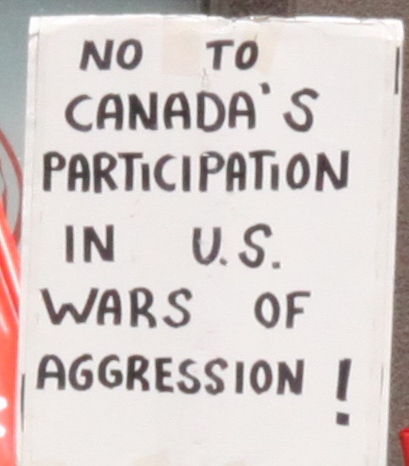
After seeking to establish the "shared values" of Canada
and the U.S. and telling tales to hide the massive U.S. imperialist
intrusion into the lives of Canadians, Obama sought to breathe new life
into the discredited colonial notion of white man's burden. This he
recast for modern times as the "responsibility to protect," of which
the Liberals have historically been eager champions. The U.S. is
counting on Canada to once again provide the "moral" justifications for
imperialist aggression and occupation in the name of "protecting
innocents."
"In fact, both the United States and Canada believe our own security,
and not just prosperity, is enhanced when we stand up for the rights of
all nations and peoples to live in security and peace," he said. "I
don't believe that these are American values or Canadian values or
Western values. I believe and Justin believes and I hope all of you
believe these are universal values and we must be bold in their defence
at home and around the world, and not shy away from speaking up on
behalf of these values of pluralism and tolerance and equality." Then,
cutting to the chase of what Canada's role will be at this time within
the imperialist system of states, Obama said, "I fear sometimes that we
are timid in defence of these -- these values. That's why we'll
continue to stand up for those inalienable rights here in our own
hemisphere, in places like Cuba and Venezuela, but also in more distant
lands, for the rights of citizens in civil society to speak their mind
and work for change; for the rights of journalists to report the truth;
for the rights of people of all faiths to practice their religion
freely."
Right on cue, eight days later Canadian Foreign
Minister Stéphane Dion issued a statement directly interfering
in Venezuela's internal affairs, specifically in its judicial system.
Dion called for the release of Venezuelan counterrevolutionary leader
and convicted criminal Leopoldo López and others convicted of
inciting violence and other crimes under Venezuelan law. He called them
political prisoners to divert from their crimes and promote the lie
that the government suppresses dissent.
Obama also spoke about Colombia and the
peace
process taking place in that country to end a decades-long war
financed, armed and instigated by the U.S. under various
pretexts, including the so-called War on Drugs. He spoke of
"North America" being a partner, saying, "Colombia is poised to
achieve a historic peace, and the nations of North America will
be an important partner to Colombia going forward, including
working to remove land mines." Then, again eight days later,
International Development Minister Marie-Claude Bibeau travelled
to Colombia -- her first trip to Latin America -- to shill for
various post-conflict projects Canada says it is going to
undertake for "women and girls and demining."
Annexation of Canadian Embassies as Tools for
Imperialism
Obama also discussed the program undertaken by the
Liberals to complete the annexation of Canada's diplomatic corps into
U.S. imperialism's schemes for destabilization and regime change.
"Around the world, Canadian and American diplomats working together can
make a difference," he stated. This alludes to the fact that the
Trudeau government has mandated meddling in countries' internal affairs
in the name of promoting "human rights and freedom" as a "core
activity" for all ambassadors and other heads of mission. As announced
by Minister of Global Affairs Stéphane Dion on May 17, all embassies
will have their performance monitored and reviewed based on their
promotion of "human rights, freedoms and inclusion" in foreign
countries.
This coincides with the Liberal government's creation of the new Office
of Human Rights, Freedom and Inclusion. It amounts to making Canadian
embassies a kind of laboratory for promoting "Canadian values" and
using social media to connect directly with and promote dubious "human
rights activists" in targeted countries where the U.S. wants regime
change. In Venezuela, Canada's ambassador specializes in this type of
"direct diplomacy." In Syria it was recently revealed that a Canadian
diplomat has been playing a key role in mobilizing and coordinating
forces
intent on regime change. It appears that under Trudeau such activities
are being made the norm at a time when the world's people despise the
role the U.S. embassies play as bases of foreign intervention.
U.S. Wants Canada to Play a Bigger Role in NATO

Halifax action, July 9, 2016 on the occasion of the NATO summit in
Warsaw.
Obama appealed for increased resources and troops
from Canada to be placed under its command through NATO to suppress the
peoples of Eastern Europe and to threaten
Russia and other non-NATO countries in the region. "Meanwhile,
when nations violate international rules and norms, such as
Russia's aggression against Ukraine, the United States and Canada
stand united, along with our allies in defence of our collective
security," he said.
"And doing so requires a range of tools, like economic
sanctions. But it also requires that we keep our forces ready for
21st century missions and invest in new capabilities. And as your
ally and as your friend, let me say that we'll be more secure
when every NATO member, including Canada, contributes its full
share to our common security. And if I can borrow a phrase, the
world needs more Canada," which was met by one of the 20 standing
ovations. During this ovation Obama added: "NATO needs more
Canada. We need you. We need you."
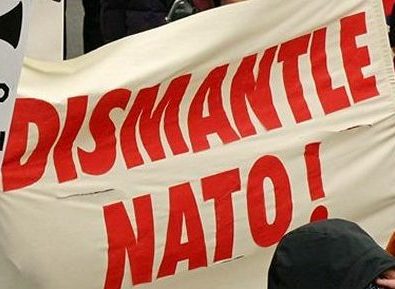 Ten days later at NATO's Warsaw
Summit, Canada
announced a significant increase in the number of forces deployed to
Eastern Europe and the Baltic states. This includes leading a battalion
in Latvia and an increased naval and air force presence to harass and
provoke Russia on land, in the air and on water. Ten days later at NATO's Warsaw
Summit, Canada
announced a significant increase in the number of forces deployed to
Eastern Europe and the Baltic states. This includes leading a battalion
in Latvia and an increased naval and air force presence to harass and
provoke Russia on land, in the air and on water.
Immediately following the NATO Summit, Prime Minister
Trudeau and International Trade Minister Chrystia Freeland visited
Ukraine to sign a Free Trade Agreement as well as to observe Canadian
troops in action alongside Ukrainian military forces. Canadian troops
were taking part in war games targeting "Russian-backed rebels in
Eastern Ukraine." In other words, suppressing Ukrainians' opposition
and resistance to the regime installed in Ukraine by a U.S.-backed coup
in 2014.
Obama also appealed for increased Canadian involvement
in the perpetual "war on terror." "[W]ith Canada's additional
contributions, including training Iraqi forces, our coalition is
on the offensive across Iraq, across Syria, and we will destroy
the terrorist group ISIL. We will destroy them. We'll continue
helping local forces and sharing intelligence from Afghanistan to
the Philippines so that we're pushing back comprehensively
against terrorist networks."
Days later, Canada announced $465 million to continue
funding Afghanistan's Security and Defence Forces, which the U.S. is
training and accompanying on their combat missions, as well as "to
support women's and girls' rights and empowerment, and to help meet the
basic needs of Afghans." Canada's Defence Minister Harjit Sajjan also
paid a visit to Iraq this week for meetings with "Iraqi and Kurdish"
officials and to inspect Canadian troops put under U.S. command as part
of its Global Coalition Against ISIL. The government noted that Sajjan
will attend a summit of Coalition defence ministers.
Obama's passing of the torch to Trudeau and the
sycophantic
support
this received in the House
of Commons from MPs reveals the schemes afoot to further embroil Canada
in the United
States of North American Monopolies for the purposes of dominating
rivals internationally
through the use of force. This is the program Obama came to sell to
Canada and that he is instructing
Trudeau to implement. All of the smoke and mirrors reaffirms the
importance of Canadians
building the movement for an anti-war government to withdraw Canada
from NATO and
NORAD and other aggressive military alliances and arrangements which
place Canadian
troops and territory at the disposal of the U.S.
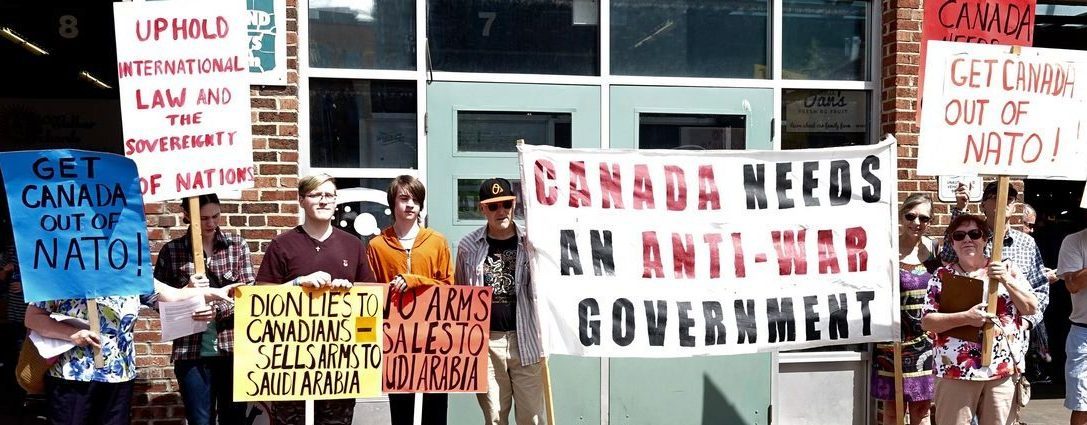
Picket in Edmonton to Get Canada Out of NATO, July 9, 2016.
Whatever one thinks of Obama as an individual, or
Trudeau for that
matter, the fact remains
that the Canadian, Quebec and Indigenous peoples have their own
thinking and right to decide
the direction of their society. They have common cause with the
American people who also oppose wars of aggression and occupation and
do not want their sons and daughters sent abroad to be used to
slaughter others and to be slaughtered. Canadians must pursue peace by
pursuing their own nation-building project which rejects being subsumed
into the United States of North American Monopolies. The
opposition of the workers of Canada, the U.S. and Mexico to neo-liberal
free trade deals as well as to imperialist war makes this clear.
Canada must stand as a force for the peaceful resolution of conflicts,
non-interference in the affairs of other nations and fraternal
relations amongst all peoples of the world. This is the stand of
Canadians which was completely hidden from view with the "warm welcome"
Obama received from those who have usurped elected positions by
manipulating their positions of privilege and power.

Dangerous New Measures Tabled in Parliament
During its last two weeks of sitting, the Liberals
introduced three new pieces of legislation in the House of Commons
which are part of placing Canada firmly in the grip of U.S. security
agencies while keeping hidden the black ops and dirty activities of
police agencies against the peoples of Canada, the United States and
Mexico. The Liberals are clinching Harper government measures that
permit U.S. security agencies to operate permanently within Canada and
command Canadian security agencies, grossly violating Canadians'
privacy and civil rights. At the same time, the government is putting
in place the means to keep all these activities secret and under wraps.
National Security and Intelligence Committee
Unveiled
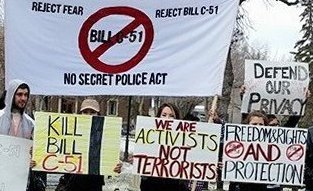
On June 16, the government
tabled Bill C-22, An Act to
establish the
National Security and Intelligence Committee of Parliamentarians and to
make consequential amendments to certain Acts. The legislation
provides for the Liberals'
"parliamentary oversight" of security agencies that are already
implementing the arbitrary powers given to them by the
Conservatives with Liberal support through Bill C-51, to which
Canadians were overwhelmingly opposed. Instead of repealing that
Act and the expanded arbitrary powers it gave police and security
agencies to violate Canadians' basic rights, the Liberals are
actually entrenching these powers and ensuring that dirty actions
taken under the "anti-terror law" are kept secret while creating
the illusion they are providing transparency through an
"oversight" committee.
The Committee would be a statutory committee of
parliamentarians appointed by and housed within the executive
branch of the government. This is said to "give the committee a
high degree of independence and access to classified government
information, while providing for necessary controls on the use
and disclosure of this information." In other words it would
operate under the control of the executive.
It is said the Committee would "have a broad
government-wide
mandate and special access to highly classified information to
review national security and intelligence activities." Who
decides what it can and cannot review and what it can and cannot
report is a serious matter.
The Committee would be made up of members of Parliament
and
Senators, all appointed by the Governor General on the
recommendation of the Prime Minister. It will have nine members --
two from the Senate and seven from the House of Commons (with a
maximum of four MPs from the governing party). The Liberals
describe their committee as multi-partisan.
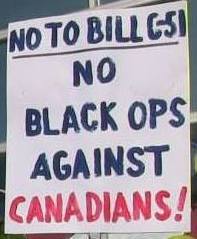
Committee members would be required to obtain a security
clearance and swear an oath of secrecy before assuming their
position on the Committee, and would need to maintain the
confidentiality of information they receive. Committee members would be
vetted for their security clearance by the Canadian Security
Intelligence Service (CSIS), the very agency they would be responsible
for "overseeing." The oath of secrecy will have Committee members swear
that they "...will be faithful and bear true loyalty to Canada and to
its people, whose democratic beliefs I share, whose rights and freedoms
I respect" but "not communicate or use without due authority any
information obtained in confidence by me in [this] capacity." Anything
that a minister decides is off-limits -- for whatever reason
-- must be kept secret or the members could be brought up on
charges under state secrets legislation. This is clear in the
legislation: "Members would not be able to claim parliamentary
immunity if they disclosed what is deemed classified
information."
Revealing who decides what gets reviewed and what
doesn't,
the legislation says that a minister would have the authority to
stop a review of the Committee if it would be injurious to
national security. In addition ministers can withhold what they
decide is "special operational information" if in the minister's
opinion its disclosure would "harm national security." This means
that if a minister does not want something disclosed, even though
she or he would have to provide reasons which prevent the disclosure,
these are provided to a committee that cannot disclose anything deemed
"classified." For instance, a "reason" can be that disclosure
would compromise our relations with the United States, and that
is that. Nothing further is required, and there is no accountability
whatsoever.
In addition, once a report is completed by the
Committee, the
government will review it before it is tabled to ensure that it
"[does] not contain classified information," which the
government would decide and no one on the Committee could
publicly challenge. This clearly shows the extent to which the
whole aim is to provide an impression of accountability when in
fact arbitrariness and secrecy are being made a principle of
governance.
New Border Measures to Police Movement of People and
Goods
The Liberals introduced on June 15 Bill C-21, An
Act to
amend the Customs Act. The legislation will allow the Canada
Border Services Agency to be informed by the U.S. border agencies
when anyone leaves Canada at a land border crossing, permit
Canadian border agents to inspect goods normally exempt from
controls under the Customs Act and share travel
information about Canadians leaving Canada with the Department of
Employment and Social Development for purposes of administering
the Old Age Security Act. Though the details are not
clear, this tracking of Canadians' movement across land borders
may open the door for governments to use such information to deny
or limit access to benefits under other social programs as
well.
Bill C-21 is part of Canada and the U.S. establishing a
single security apparatus under U.S. control. All movement into North
America and between countries within North America is to be tracked and
fed into various "risk assesment" and other databases. Profiling of
citizens and residents based on meta-data and travel habits will single
them out for surveillance and persecution even though they have
committed no crime.
Expanding Placement of U.S. Security Agents in Canada
On June 17, the Liberals introduced Bill C-23, An
Act respecting the
preclearance of persons and goods in Canada and the United States.
The Bill would
allow the Minister of Public Safety and Emergency Preparedness to
designate "pre-clearance
areas and perimeters" in Canada wherever the Minister decides.
Pre-clearance refers to the
concept of having goods and people screened and possibly held by
Customs and Immigration
before reaching a destination country's border. It is done in the name
of eliminating backlogs
at the border, however it is also used to justify placing U.S. security
forces in Canada at
border crossings, airports and ports. The new bill prepares conditions
for the Minister to
establish pre-clearance areas anywhere, including at points of
production, which essentially
means permitting U.S. security agents to be placed at workplaces or
wherever else the
Minister decides to establish a pre-clearance area. Up until now
pre-clearance has been done
on an ad-hoc pilot project basis. However, if passed, the bill would
give the Minister the
power to expand the program at his or her whim. The bill also
establishes arrangements to set
up pre-clearance by Canadian border officials in the United States --
which does not exist at
the present time -- and to limit the ability of the Canadian government
to request the
extradition or arrest of a U.S. preclearance officer who has violated
Canadian law. In other
words, the legislation is part of establishing a new arrangement in
which U.S. officers
permanently placed inside Canada would not be subject to Canadian laws
so long as they
return to the United States after committing a crime.

RIMPAC 2016 Naval
Exercises
Canada's Participation in Massive U.S.-Led War Games in
the
Pacific

Warships in Pearl Harbour for RIMPAC war exercises. (U.S. Navy)
The U.S. imperialists, as part of increasing their war
preparations worldwide, are leading the world's largest maritime
war games known as the Rim of the Pacific (RIMPAC) 2016 from June
30-August 4 in and around the Hawaiian Islands and southern
California. Canada is participating in these war games again as
it has every two years since they began in 1971.
This year RIMPAC involves 26 countries, 45 ships, five
submarines, more than 200 aircraft and 25,000 personnel. The 2016
edition is taking place in the context of the U.S. pivot to Asia
started under the Obama regime, which includes the attempts to
isolate the Democratic People's Republic of Korea (DPRK) --
earlier this year the largest ever war games in Asia, Key
Resolve/Foal Eagle 2016, were aimed directly at invading the
DPRK. It also includes the threat to China, Russia and the DPRK
posed by the Terminal High Altitude Area Defense anti-missile
system to be installed in south Korea, as well as U.S.
interference in the territorial disputes in the South China
Sea.
RIMPAC is used by the U.S. to integrate command and
control
with other countries, embroil them in U.S. imperialist
misadventures and as a show of force. The U.S. military presents
these war preparations in a banal and misleading manner. It says
that RIMPAC "provides a unique training opportunity that helps
participants foster and sustain the cooperative relationships
that are critical to ensuring the safety of sea lanes and
security on the world's oceans."
Opposition to RIMPAC
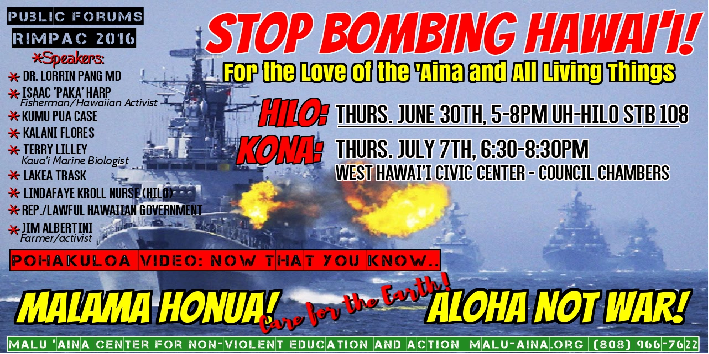
Anti-war activists, environmentalists, those demanding
Hawaii's sovereignty (an independent kingdom before the U.S.
annexed it in 1893) and others are holding actions to oppose
RIMPAC 2016, as part of the broader movement to oppose the U.S.
military presence in Hawaii. Similar to the U.S. Navy's 50 years
abuse of the island Vieques in Puerto Rico, the U.S. military's
Pohakuloa Training Area on the island of Hawaii, has caused
serious environmental damage and the local people have long
demanded that the military get out and ensure the land is
rehabilitated. The Malu 'Aina (Land of Peace) Center for Non-Violent
Education
and Action pointed out in a June 29 statement:
"The U.S. is currently waging wars in at least six
countries, and provoking and risking new wars with other
countries, including possible nuclear war with Russia and
China.
"Meanwhile, RIMPAC (Rim of the Pacific), the world's
largest
U.S.-led war game is now taking place in and around Hawaii.
[...]
"During RIMPAC countries conduct live-fire operations
that
include surface-to-air weapons, air-to-air missiles,
surface-to-surface weapons firing, laser-guided bombs, and rounds
of naval gunfire from surface combatant warships. Units fly air
sorties and drop bombs. Ground forces complete amphibious
landings and conduct live-fire. In all, different training events
are scheduled in all Hawaiian operations area, encompassing
Kaneohe Bay, Bellows Air Force Station, the Pacific Missile Range
Facility, and the Pohakuloa Training Area, etc.
"It has been confirmed that RIMPAC air and ground
live-fire
will be taking place at Pohakuloa in the center of Hawaii Island
during the month of July. Pohakuloa is contaminated with Depleted
Uranium (DU) radiation and a wide range of other military toxins.
Continued bombing risks spreading the contamination downwind,
endangering the lives of troops, residents and visitors alike. DU
is particularly dangerous when small particles are inhaled and
can cause cancer, birth defects and genetic damage. In short,
RIMPAC is an attack on the air, land and sea environment of
Hawai`i! We want it stopped!
"Free Hawaii & the World from the Curse of
Militarism
& War!"
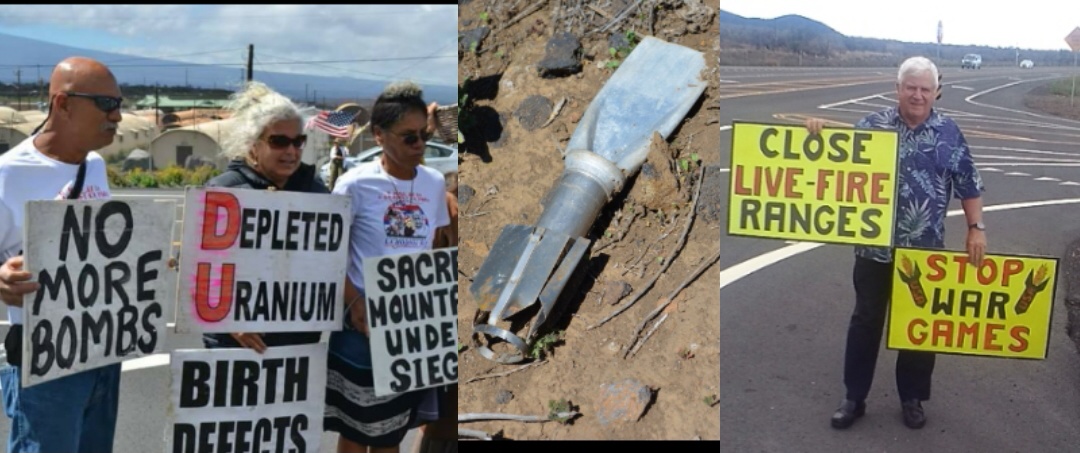
RIMPAC 2016 Participants
RIMPAC is hosted by U.S. Pacific Fleet and led by U.S.
Vice
Admiral Nora Tyson, commander of the U.S. 3rd Fleet (C3F), who serves
as the Combined Task Force (CTF) commander. Royal Canadian Navy Rear
Admiral Scott Bishop serves as deputy commander of the CTF and Japan
Maritime Self Defense Force Rear Admiral Koji Manabe as the vice
commander. Other key leaders of the multinational force include
Commodore Malcolm Wise of the Royal Australian Navy, who is in command
of the maritime component; Brigadier General Blaise Frawley of the
Royal Canadian Air Force, in command of the air component; and Royal
New Zealand Navy Commodore James Gilmour, in command of the amphibious
task force.
This year's exercise includes forces from Australia,
Brunei, Canada,
Chile, China, Colombia, Denmark, France, Germany, India, Indonesia,
Italy, Japan, Malaysia, Mexico, Netherlands, New Zealand, Norway, Peru,
the Republic of Korea (south Korea), the Republic of the Philippines,
Singapore, Thailand, Tonga, the United Kingdom and the United States.
Australia, like Canada, has participated alongside the U.S. in every
RIMPAC. Denmark, Germany and Italy are participating for the first time.
The U.S. Navy website conveys Brazil's absence as due to
"unforeseen
scheduling commitments." The most notable absence is that of the
Russian navy, highlighting that these war games are aimed in part at
Russia.
Also notable is the participation of several European
countries that
are located far from the Pacific Ocean. Why are they in RIMPAC if not
because they are members of NATO?
Japan's participation in these aggressive war games is
also notable
given that the government of Prime Minister Shinzo Abe is attempting to
revise the country's constitution to remove the limitation on the
deployment of Japanese forces beyond national self-defence.
Regarding the participation of China, Xinhua
reported on June
29: "A Chinese fleet with about 1,200 soldiers and officers arrived in
Pearl Harbor Wednesday [June 29] to take part in the Rim of the Pacific
2016 (RIMPAC 2016) multinational naval exercise. It is the second time
the Chinese Navy has taken part in RIMPAC. The fleet, PLAN TG-XI'AN, is
composed of missile destroyer Xi'an,
missile
frigate
Hengshui,
supply ship Gaoyouhu,
hospital ship Peace Ark,
submarine rescue vessel Changdao
and three helicopters, as well as a marine squad and a diving squad.
"As previously agreed by China and the United States,
the Chinese Navy
will take part in drills including gunfire, damage control and rescue,
anti-piracy, search and rescue, diving and submarine rescue. Sports
events and exchanges will also be held.
"The fleet left on June 15 from a military port in
Zhoushan City in
east China's Zhejiang Province. At the sendoff at Zhoushan, deputy navy
commander Wang Hai said the mission was important for the 'new type of
major-country relationship' between China and the United States, in
addition to promoting military-to-military cooperation and exchanges."
The absence of Russia, a large pacific rim country but
the inclusion of
China as well as the participation of European countries which are not
anywhere near the Pacific underscores the true aims of RIMPAC which is
to impose the U.S. as the gendarme in the Asia-Pacific and keep its
rivals in check.
Canada's Participation
Canada has sent four warships, several aircraft and
more
than 1,500 Canadian sailors, soldiers, airmen and airwomen to
RIMPAC 2016. The maritime component is comprised of the Halifax-class
frigates
HMCS
Calgary and
HMCS Vancouver, as well as the Kingston-class
coastal
defence vessels HMCS Saskatoon and HMCS Yellowknife,
and a team of clearance divers. As noted above, Canadian
military commanders have been put in various leadership
positions.
Reporting on the departure of the Canadian vessels for
RIMPAC on June 14, Xinhua wrote:
"Beyond their exercise responsibilities, the Kingston-class
warships
will
also
carry
out
testing
and
exercises
using
advanced
mine
countermeasure
equipment,
thereby
reducing
risks to
sailors and warships while increasing interoperability with
allied nations.
"HMCS Calgary and Vancouver will test
weapon
systems and upgrades to their equipment. RIMPAC will allow the
Canadian warships to test electronic countermeasures designed to
better protect sailors and warships operating in war zones, and
fire Evolved Sea Sparrow and Harpoon missiles as well as
heavyweight torpedoes to increase the warfighting capabilities of
the Halifax-class warships."
Minister of National Defence Harjit Sajjan in a May 31
press
release stated, "Canada has participated in every RIMPAC since
1971. Over the years, our participation has helped us build and
foster collaborative relationships with our allies and partners
in the region. RIMPAC 2016 will once again provide the Canadian
Armed Forces (CAF) with a valuable training opportunity, while
demonstrating Canadian leadership and operational excellence
abroad."
The Department of National Defence, in the same press
release, outlined "Canada's Objectives" at RIMPAC 2016:
"The biennial exercise provides an opportunity for all
services (Canadian Army, Royal Canadian Navy and Royal Canadian
Air Force) to train in a joint environment along with
international allies and partners.
"The joint forces deployed on RIMPAC comprise personnel
and
assets from across Canada, and may be drawn from any or all of
the primary force-generators of the Canadian Armed Forces.
"The CAF objectives during RIMPAC are to:
- develop and implement plans to enable the army, navy
and
air force to operate as a joint force within a multinational
coalition setting;
- enhance the CAF's ability to conduct
international missions in accordance with the Government of
Canada's objectives; and
- develop skills and procedures designed
to foster operability, readiness, communications with partners
and crisis response capabilities."
These justifications and so-called objectives for
Canada's
participation are shameless attempts to cover up Canada's
subservience to U.S. imperialist interests and the dictate of
Might Makes Right that seeks to resolve all issues through the
threat or the use of military force.
The working people of Canada and Quebec must vigorously
reject Canada's participation in RIMPAC 2016 and all U.S. war
preparations, aggression and war. They must ensure that Canada
has an anti-war government so that it is a force for peace in the
world that provides genuine security for all countries by
upholding the principles of international law whose fundamental
aim is to ensure the resolution of conflicts through peaceful
means.

U.S. War Preparations on Korean Peninsula
Support the Korean People's Opposition to U.S. Missile
Defence System in South Korea!
- Philip Fernandez -
The United States and its puppet regime in south Korea
announced on July 8 that the U.S. Terminal High Altitude Area Defense
(THAAD) anti-missile system will be deployed in south
Korea. South Korean press report that this was a sudden and unexpected
announcement, with the public having been led to believe that any such
decision would not come until the fall. The
announcement also came a day after the U.S. expanded sanctions
against the Democratic People's Republic of Korea (DPRK) and its
leadership and amidst hysteria and disinformation being whipped
up against the DPRK as the cause of instability in the region,
not the U.S. and its tens of thousands of troops and nuclear
arsenal.
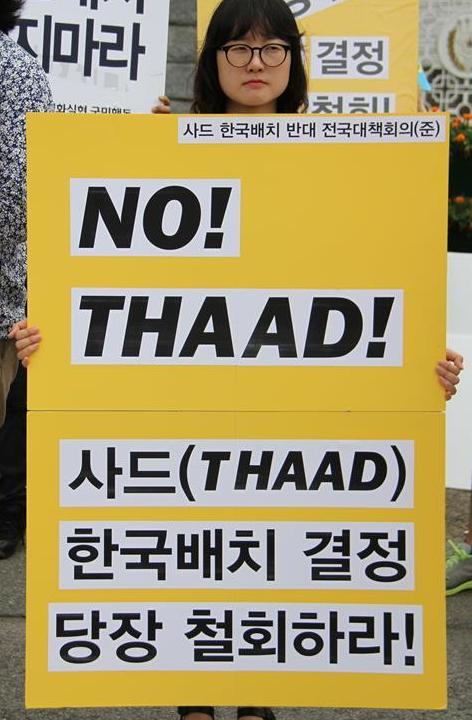
All peace- and justice-loving people in Canada and
worldwide should resolutely oppose plans by the U.S. to install its
THAAD anti-missile system in south Korea. These plans face broad
opposition by the peace-loving Korean people, the peoples of Asia and
the governments of the DPRK, China and Russia. Such
systems, despite claims that they are defensive in nature, are part and
parcel of bolstering the U.S. offensive nuclear arsenal. Far from
serving the cause of peace and stability on the Korean peninsula, which
is the aspiration of the Korean people and their neighbours, the THAAD
system will increase tensions and further destabilize the Korean
peninsula to a point where a thermonuclear war could break out that
would engulf the region and endanger all humanity. It must not pass!
The Canadian people must organize to do everything possible to avert
such an outcome.
According to the U.S. administration, installation of
THAAD
is necessary to counter the nuclear missile threats from the
DPRK. This "argument" is as bogus as it gets. History shows that
immediately following the Second World War, all humanity led by
the Soviet Union was organizing to ensure that never again would
there be another catastrophic world war. In response, the
Anglo-American imperialists led by the Truman administration
launched the Cold War on the basis of the Hitlerite lie that the
Soviet Union was arming itself to attack the "free world" and
start World War Three. This disinformation, also propagated by
the Canadian state, was then used by the U.S. to justify a
massive nuclear arsenal to threaten with annihilation any people
or nation that opposed U.S. imperialist dictate.
Those targeted by what continues to be the world's
biggest nuclear arsenal include the Korean people. In the Korean War --
launched on May 25, 1950 under the Truman Administration's Cold War
doctrine of the "containment of Communism" -- the U.S. and its allies,
including Canada, unjustly intervened militarily to suppress the Korean
people's striving for self-determination and reunification of their
divided country. In that war, the U.S. threatened to use nuclear bombs
against the DPRK and China, as it did in Hiroshima and Nagasaki. That
threat remains to this day.
The U.S. has never forgiven the DPRK for defeating it
in the Korean War and forcing it to sign the Korean Armistice Agreement
on July 27, 1953 that brought an end to the fighting in that brutal
war. The U.S. has done everything to sabotage the Armistice Agreement
and provoke another Korean War. The countless efforts by the DPRK in
keeping with
Article IV of the Armistice Agreement to have a peace treaty
signed with the U.S. have been outright rejected by the latter.
The massive annual war games carried out by the U.S. and south
Korean forces and more recently between the U.S., south Korea and
Japan, in which Canada has sometimes participated as an
"observer," are all aimed at waging war and regime change against
the DPRK. These facts alone show who is for peace and who is for
war on the Korean peninsula. The THAAD system is part of these
war preparations against the DPRK, as well as China and
Russia.
Far from protecting south Korea from a nuclear attack
from
the DPRK, as the U.S. and the Park Geun-hye regime in south Korea are
telling the world, THAAD is aimed at giving the U.S. imperialists
and their allies a strategic advantage by enabling a preemptive
nuclear strike against the DPRK, China or Russia while supposedly
neutralizing counterstrikes. China and Russia have both expressed
opposition to the U.S. placing the THAAD system in south Korea
where it can be used to monitor the Chinese and Russian
militaries. Furthermore, both China and Russia earlier this year
announced that they have developed and successfully tested
high-level supersonic gliders that can breech the THAAD
system.
These big power rivalries have serious consequences for
the
Korean people. The Korean people have the right to live in peace
and stability like everyone else so that they can flourish. The
DPRK, which has historically and consistently defended the Korean
nation, has stated that it will take all measures against the
THAAD system and to prevent another Korean War including using
its "nuclear deterrent force" in self-defence. The leadership of
the DPRK continues to call on the U.S. to sign a peace treaty to
end the Korean War. This is what is needed to stabilize the
situation on the Korean peninsula and create the conditions for
the peaceful, independent reunification of Korea so that it can
take its rightful place as an honoured sovereign independent
country among the nations of the world.
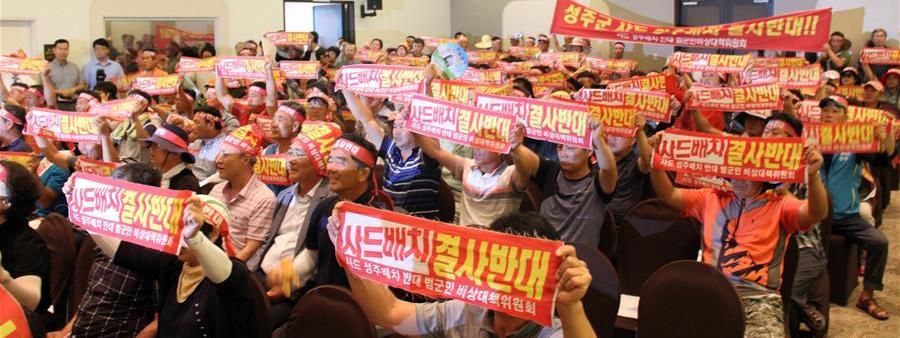
Protest against THAAD deployment in Seoul, July 13, 2016.
About the Terminal High Altitude Area Defense
System
The THAAD system was conceptualized in the 1990s and
tested
in 2005 by U.S. weapons monopoly Lockheed Martin, the primary
manufacturer of the system for the U.S. military.
The THAAD system is aimed at destroying "all types of
ballistic missile warheads including Weapons of Mass Destruction
(WMD)" as they begin the terminal phase of their flight. The U.S.
Department of Defense claims that the THAAD system has proven 100
per cent effective based on its tests, while other countries
claim to have developed means to overcome it.
The THAAD interceptor uses kinetic energy rather than
an
explosive warhead to carry out a "kill." It is also touted as
being easily transportable and effective even when facing "mass
raids." The system is comprised of five components: interceptors,
launchers, radar, a fire-control unit and support
equipment.
Its range is said to be 200 km. South Korean press
point out
the proposed site for the system in Seongju is too far south to
provide coverage for the capital. In a July 14 editorial, the
south Korean newspaper Hankyoreh pointed out, "If THAAD is
deployed in Seongju, Seoul, and most of its suburbs will fall
outside of THAAD's 200km defence range. It is absurd for the
Ministry [of Defense] to claim that it decided to deploy THAAD to
protect the people from North Korean attacks when it leaves a
densely populated area that is home to nearly half of South
Koreans outside of THAAD's defense range.
 "If THAAD is deployed in Seongju, the Seoul
area will
not be
included in its protective range, while U.S. military bases in
Pyeongtaek, Osan, Gunsan, Daegu and Chilgok will be included. "If THAAD is deployed in Seongju, the Seoul
area will
not be
included in its protective range, while U.S. military bases in
Pyeongtaek, Osan, Gunsan, Daegu and Chilgok will be included.
"The implications here are obvious: the campaign to
deploy
THAAD was purely organized and promoted by U.S. interests, and
THAAD is a system designed to defend the U.S. military."
In the face of growing alarm that the electromagnetic
radiation emissions from the THAAD would have averse effects on human
health and the environment, the south Korean Ministry of Defense tried
to deflect these concerns by stating that the Green Pine radar
installation in the Chungcheong region and the Patriot missile defence
system in the greater Seoul area have greater electromagnetic radiation
emissions than THAAD. So, not to worry. The people have not been
placated by this facile argument and have only stepped up their
opposition.
The Hankyoreh writes, "Experts in the field
point out
that, even at such levels, exposure over the long term can be
hazardous. Choi Ye-yong, director of the Asian Citizens' Center
for Environment and Health, says, 'The Ministry of National
Defense states that exposure is dangerous to the human body only
when nearer than 100 meters and that within the restricted access
zone of 3.5 kilometers distance one is safe. Within 100 meters,
burns on the skin and ill effects to the organs are immediately
apparent, but even at 3.5 kilometers away, continuous long-term
exposure can be harmful. It's nonsense to say that there is no
problem at all.'
"When the U.S. built a permanent THAAD installation on
Guam
last year, it issued an evaluation of environmental effects which
stated that electromagnetic radiation, noise, and exhaust gases
from power generators would affect the environment. U.S. THAAD
systems are powered by military tactical generators with an
output of from 420 kilowatts to 1.3 megawatts. The environmental
report said that when such a generator is running, the noise and
gases it emits can be harmful to the surrounding wildlife
habitat. The report states that without soundproofing, the noise
of a 1.3-megawatt generator measures 85 decibels at 30 meters and
60 decibels at 530 meters. Sixty decibels is only a little lower
than the 65-decibel noise level permitted at construction
sites."
Besides Guam, THAAD batteries have been installed in
Hawaii
and on mainland U.S. Internationally, several Gulf states
allied with the U.S. imperialists have acquired the system. The
United Arab Emirates (UAE) was the first "international partner"
to procure the system in 2011, at the cost of U.S.$3.4 billion.
Oman, placed an order in 2013. Recently Saudi Arabia also placed
an order. Qatar has also expressed interest according to Lockheed
Martin.

Koreans Militantly Oppose Anti-Missile System

Protest in Seoul, Korea, July 13, 2016 against deployment of THAAD.
The Korean people north and south are united in
militantly
opposing the decision of the U.S. and south Korean government to
station a Terminal High Altitude Area Defense (THAAD)
anti-missile battery in Seongju, 296 kilometres south of Seoul.
The lack of consultation and short notice of the decision were
meant to undermine the people's opposition, but they are having
none of it. The people, especially those in Seongju, are
denouncing with increasing vehemence the Park Guen-hye government
for its treachery in imposing THAAD.
Kim Hang-gon, the Mayor of Seongju, pointed out: "There
should be sufficient discussion or consultation between the
central government and provincial government for a consensus. Our
Seongju residents, 50,000 of them, are outraged that the decision
was made unilaterally without prior consultation or agreement."
Mayor Kim and three local councillors used their own blood to
write a protest letter to the government. On July 13, local
residents filled five chartered buses to take their protest to
Seoul. Given their proximity to the proposed installation, there
is much concern that the strong electromagnetic waves will cause
environmental damage and affect their health. Local farmers, who make
up one-fifth of Seongju's population, are concerned about
negative effects on their melon crops -- they supply about 70 per
cent of the melons in Korea -- and that their livelihoods will be
destroyed.
On July 15, 3,000 residents of Seongju, wearing red
headbands that said "Opposed to THAAD!" confronted south Korean Prime
Minister Hwang Kyo-ahn and Defense Minister Han Min-koo when they paid
a visit to placate the people and to justify the decision to put the
THAAD battery in their community. The protesters were joined by some
800 students, many of whom had boycotted classes that day to attend the
rally. Outside the county office, when Hwang tried to suggest that the
deployment of the THAAD was necessary because the DPRK is building
nuclear weapons every day and posing a grave danger to the security of
south Koreans, he was jeered and pelted with eggs and water
bottles and he and the Defense Minister were forced to beat a
hasty retreat under the protection of security police.
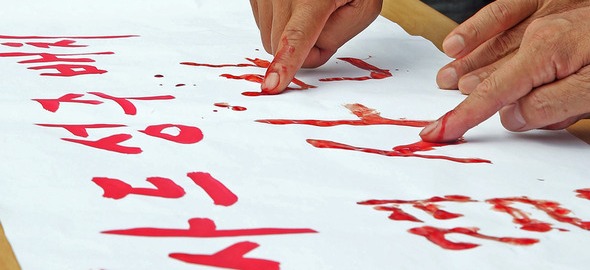
Protest letter written in blood by Mayor Kim and local councillors
opposing THAAD.
At an action at the Ministry of Defence in Seoul,
protester
Oh Mi-jeong pointed out, "There is no 'best place' to deploy
THAAD in South Korea. We strongly urge the government to withdraw
the decision to deploy the THAAD system, which will destroy peace
on the Korean peninsula and jeopardize our national
security."
The organization Solidarity for Peace and Reunification
of
Korea (SPARK) also held an action and press conference on July
13 at the Ministry of Defence. SPARK pointed out that the
government's decision to permit the deployment of THAAD in south
Korea will make it an outpost of the U.S.-Japan military alliance,
sour relations with neighbouring countries and worst of all
increase the possibility of igniting a war on the Korean
peninsula. SPARK urged the U.S. and south Korean governments to
immediately rescind the plan and pledged that it will carry on
protest actions until then.
In the north, the Committee for the Peaceful
Reunification of
Korea (CPRK) denounced the Park regime for its subordination of
the national interest to the U.S., escalating tensions between
Korean compatriots in the south and north, and offering the
Korean peninsula to foreign forces as a theatre for nuclear war.
The CPRK demanded that the decision to install the THAAD system
be annulled.
|
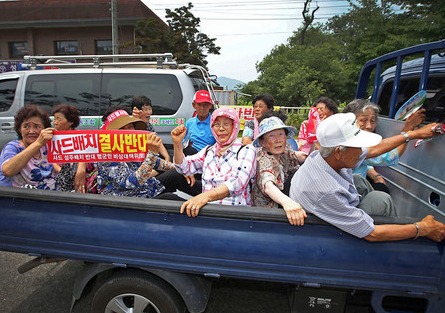
Farmers from Seongju return home after
Seoul actions, July 13, 2016.
|
To counter growing opposition against THAAD, the south
Korean
Ministry of Defence issued a statement trying to justify this
unacceptable decision. It claimed that "By operating the U.S.
THAAD battery in Seongju, we will be able to better protect one-half to
two-thirds of our citizens from North Korean nuclear and
missile threats" and "it will dramatically strengthen the
military capabilities and readiness to defend critical national
infrastructure such as nuclear power plants and oil storage
facilities, as well as the military forces of the South
Korea-U.S. alliance."
Attempts to justify THAAD will only strengthen the
resolve of the Korean people to rid their country of the U.S. military
occupiers and the servile Park Guen-hye government. It is precisely the
south Korea-U.S. military alliance that began at the end of the Second
World War that has posed the gravest danger to peace, security and
stability on the Korean peninsula. The Korean people both north and
south have more than 70 years of direct experience with U.S.
imperialist military occupation and plunder of south Korea. They are
stepping up their joint resistance aimed at getting rid of the U.S.
imperialist occupiers of their homeland once and for all, which is the
only way to guarantee a permanent peace on the Korean peninsula. All
peace- and justice-loving people in Canada and around the world stand
as one with the Korean people in demanding the repeal of the decision
to place the THAAD missile system on Korean soil, and the withdrawal of
all U.S. troops and armaments from the Korean peninsula.
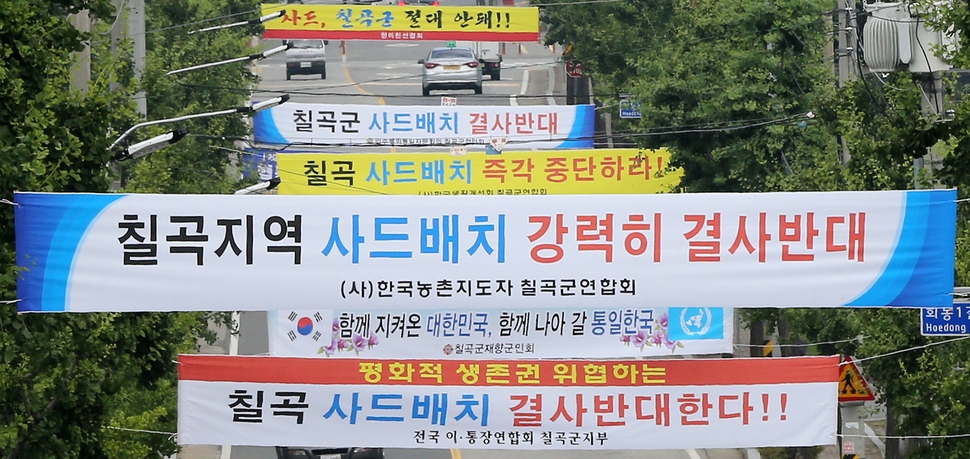
Banners opposing deployment of the THAAD missile defence system in
Chilgok, North
Gyeongsang Province, one of the possible sites, on July
8, the day South Korea and the U.S.
announced the decision.

Nefarious "Theory of North Korean Threat"
On July 12, the Permanent Mission of the
Democratic
People's Republic of Korea (DPRK) to the United Nations issued a press
release
containing the text of an essay by Kim Kwang Hak, Research Fellow
at the Institute for American Studies at the DPRK's Ministry of
Foreign Affairs. In this essay, entitled "The 'Theory of
the North Korean Threat' and the True Intention of the U.S.," the
author
addresses
U.S.
allegations
that
the
DPRK
is
the
main
threat
to
peace
and
security
on
the Korean peninsula, and
postulates the U.S.'s real intentions in making these
accusations.
The author begins by noting that in the wake of the
DPRK's
successful test-launch of the surface-to-surface
intermediate-range strategic ballistic missile Hwasong-10 on June
23, the U.S. not only condemned the missile launch as a violation
of UN Security Council resolutions, but claimed that it
"escalates and increases tension and instability on the Korean
peninsula and in the region." The author contends that these
accusations are now being used by the U.S. to justify escalating
the annual U.S.-south Korean joint military exercises, Ulchi Freedom
Guardian, held in
August, which target the DPRK for regime change.

The author argues that the self-defence measures the
DPRK is
taking cannot be construed as "threats" or "provocations" in the
context of international law and real life given the escalating
military threats by the U.S. against it. He affirms that "the
DPRK's measures to consolidate its national defence power is a
legitimate exercise of its self-defence rights which fully
complies with the UN Charter and the other international
laws."
As evidence, the author cites the "Responsibility of
States
for Internationally Wrongful Acts" document adopted at the 53rd
session of the UN committee of International Law proceedings in
November 2001. Article 3 of Chapter 1, Part One states: "The
characterization of an act of a State as internationally wrongful
is governed by international law. Such characterization is not
affected by the characterization of the same as lawful by
internal law." He further cites Article 21 of Chapter 5: "The
wrongfulness of an act of a State is precluded if the act
constitutes a lawful measure of self-defence taken in conformity
with the Charter of the United Nations."
The author points out that the Charter of the United
Nations
recognizes, among other things, the "sovereign equality" of all
its member states, and the principle that member states are
prohibited from threatening or using force "against the
territorial integrity or political independence of any state."
Given that the DPRK has never attacked or used force against
another member state, he argues, there is no basis in
international law to accuse the DPRK's "nuclear tests and the
launch of ballistic missiles, and satellites" as grave 'threats'
to international peace and security." Instead, these are "lawful
measures of
self defence" taken by a sovereign member state of the UN. Kim
Kwang Hak also informs that the UN Secretariat has yet to respond
to a written request by the DPRK's Permanent Representative to the UN
for
the legal basis on which the accusation that the DPRK is a threat
to international peace and stability can be justified.
The author points out that if the nuclear tests of the
DPRK
can be called into question, the more than 1,000 nuclear tests
conducted by the U.S. -- the country with the biggest nuclear
arsenal in the world -- must also be called into question and
condemned in the strongest terms.
Kim notes: "The DPRK's measures to consolidate its
national
defence power are legitimate self-defensive measures in view of
the U.S.'s decade-long hostile policy towards the DPRK, of which
the concentrated expression is its military threat and
blackmail." He cites a report from the SIPRI (Stockholm
International Peace Research Institute) on June 13, which informs
that the U.S. has a stockpile of 7,000 nuclear weapons and that
the U.S. administration is planning to "appropriate U.S.$348
billion for the modernization of the nuclear weapons during the
period 2015-2024." Such are the plans of the biggest nuclear
power state in the world that has been threatening the DPRK for
the last seven decades, the researcher points out.
The author further elaborates that the U.S. has never
recognized the sovereignty of the DPRK since its founding in
1948, and has pursued a hostile policy towards that sovereign
country on the political, economic and military fronts. The
author emphasizes that the key element of U.S. hostile policy
against the DPRK is on the military front with the key aspect
being ongoing nuclear blackmail. The author states that the
introduction of strategic bombers such as the "B-2" and "B-52H,"
the stealth fighter bomber "F-22" and "Ohio Class" nuclear power
submarines into south Korea, as well as the annual staging of
ever larger joint military drills aimed at the DPRK can only be
seen as aggressive preparations for a pre-emptive military strike
against the DPRK in the near future.
It is within these concrete circumstances that the
DPRK, as a
measure to "deter nuclear war threats posed by the U.S.," has
pursued the development of its own ballistic missiles and
"smaller, lighter and diversified nuclear weapons," the author
notes. He points out that DPRK leader Kim Jong Un has emphasized
that the purpose of the DPRK's nuclear self-defence program is to
avert nuclear war itself.
Another noteworthy point made in the essay is that if a
country were "to bring nuclear bombers, nuclear submarines,
nuclear aircraft carriers and install a missile defence system
around the U.S. and stage large scale joint military drills every
year, the U.S. would make a fuss." The author references the
Cuban Missile Crisis to make his point.
The author writes that in the face of these realities,
to
avert nuclear war and ensure its right to be, the DPRK has found
it necessary to build a nuclear deterrent force that is strong
enough to stay the hand of the U.S. nuclear warmongers.
The essay explains that U.S. disinformation about the
supposed nuclear threat posed by the DPRK to regional and world
peace and security is aimed at diverting attention from the
U.S.'s own crimes and drive to dominate the Asia-Pacific region
and the world. It is to provide a cover for the self-serving
measures the U.S. itself is taking, such as the deployment of the
THAAD battery in south Korea to keep China and Russia in check,
as well as the strengthening of the U.S./south Korea/Japan
military alliance. The author wryly notes that even if the DPRK
quietly minds its own business, the U.S. will still create a
pretext to justify a war so as to take over the entire Korean
peninsula in pursuit of its geopolitical interests.
Kim Hwang Hak concludes the essay by stating that the
DPRK's
nuclear deterrent capacity has made it possible to check U.S.
aggression and ensure a level of equilibrium on the Korean
peninsula. In the event of another war breaking out on the Korean
peninsula, "all responsibility will be borne by the U.S.
because of its distorted attitude towards the DPRK." For its
part, the DPRK will "wage a vigorous struggle to remove, by means
of its powerful nuclear deterrent, the root cause of the threat
of nuclear war created by the U.S. and to safeguard peace on the
Korean peninsula and the rest of the world."
The domination by the big powers, particularly the
U.S., of
the United Nations -- especially at the Security Council -- has
made it virtually impossible for small countries to get a fair
hearing even as crimes are being committed against them and their
people. The DPRK has been forced to take matters into its own
hands, and protect its sovereignty and independence by developing
its own nuclear deterrent capacity. Many times the government of
the DPRK has pointed out that it would much prefer to invest its
scarce financial resources in social programs that benefit the
citizens of the DPRK rather than in weapons for self defence. All
truth- and justice-loving people must stand with the DPRK and
support its right to peace and a prosperous future.

No to Mexican State Terrorism and
Criminalization of Resistance!
Peoples' Human Rights Observatory Calls for
Dialogue with
Teachers
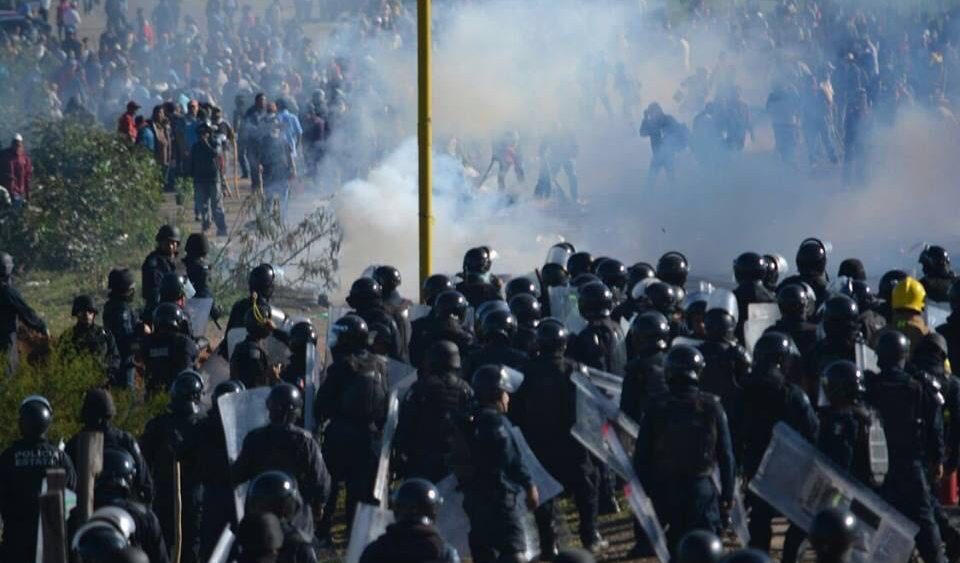
State repression against the people of Oaxaca, Mexico, June 19, 2016.
In order to impose its reforms to the education system,
the Mexican government has started a war against the democratic
teachers, which has now broadened to all sectors of the
population who support them. Amongst the outcomes of this
repression can be counted ten deaths, the imprisonment of union
leaders, attacks on whole communities and the undermining of the most
essential human rights. The point has been reached where the
defenders of human rights have been defamed, as has been the case
with the monitors of the newly-founded Human Rights Observatory.
This defamation aims to lay the groundwork for further repressive
measures against human rights defenders, which has been denounced
by the Council for Defence of the Rights of the People -- National
People's Power Movement (CODEP-MNPP)
At this time, the rights that are recognized by the
Mexican
Constitution have been suspended without any official
pronouncements. With this not only is article 29 of the Mexican
Constitution [governing temporary suspension of constitutional
provisions] violated but also the guarantees of the right to
assembly of human beings and citizens included in the Constitution,
which will soon have been in place for a century, but have rarely been
put into effect.
 The situation is extremely
serious. The government
relies
upon brute force, outside any judicial orders (even though they
invoke laws in their speeches). It is urgent to establish a
negotiating table with the Coordinadora Nacional de Trabajadores
de la Educación (CNTE) [teachers' union], with the aim of
analyzing in public the true reach of the administrative and
labour reforms which have been imposed on the teachers, and to
advance towards true education reforms and not punitive measures.
This is the root cause of the legitimate struggle of the teachers
belonging to the CNTE. This struggle must lead to immediate
freedom for the imprisoned teachers, re-hiring of those who have
been fired and the payment of overdue salaries and normalization
of the treatment of those who defend education which is public,
general and free. The situation is extremely
serious. The government
relies
upon brute force, outside any judicial orders (even though they
invoke laws in their speeches). It is urgent to establish a
negotiating table with the Coordinadora Nacional de Trabajadores
de la Educación (CNTE) [teachers' union], with the aim of
analyzing in public the true reach of the administrative and
labour reforms which have been imposed on the teachers, and to
advance towards true education reforms and not punitive measures.
This is the root cause of the legitimate struggle of the teachers
belonging to the CNTE. This struggle must lead to immediate
freedom for the imprisoned teachers, re-hiring of those who have
been fired and the payment of overdue salaries and normalization
of the treatment of those who defend education which is public,
general and free.
Report from Information Bulletin of the Oaxaca Chapter
of
Peoples' Human Rights Observatory on Repression of Teachers
Yesterday, Sunday, June 19, the federal police, the
national
gendarmerie and the state police of Mexico and Oaxaca carried out
operations against the peoples of Oaxaca, on the Oaxaca-Mexico
highway, at the entrance to Nochixtlán.
In the face of major repression leading to 10 deaths,
94
wounded and 22 disappeared, the population of the municipality of
Nochixtlán, Oaxaca are outraged and [insistent] that this
aggression was completely unjustified.
The community declared in an interview:
"President Enrique Peña Nieto refuses to talk
with the
teachers and the people because we do not accept the education
reform being imposed on us, because if it is allowed it will deny
the right of education to the children and youth of the
state."
"The hospitals denied medical attention to the wounded
population due to orders received from state and federal
authorities. In this aggression paramilitaries beat up doctors
and nurses who valiantly served the wounded population and
teachers."
On account of this, the Oaxaca chapter of the Peoples'
Human
Rights Observatory declares:
1. The people of Oaxaca and the teachers have united in
defence of public education, general and free, and against the
reforms to privatize education, peacefully and in accordance
with constitutional laws.
2. For the same reasons the people and the teachers
continue
to organize themselves peacefully to demand:
- The education reform proposed by the President of
Mexico
Enrique Peña Nieto be repealed.
- Justice in the face of the aggression against the
people of
Oaxaca and teachers.
- An end to the repression and to not permit Oaxaca to
become
a military camp.
- Respect for constitutional guarantees and human
rights as
laid out in the Universal Declaration of Human Rights and
International Covenants on human rights.
In conclusion:
1. As witnesses of the Peoples' Human Rights
Observatory we
have seen the aggression of the federal and state police who,
with hoods and civilian dress shot, beat, assassinated and
disappeared civilians and teachers with impunity. Those in
uniform fired from a helicopter, a plane and from the rooftops of
the hotels and nearby buildings towards the site of the
aggression.
The human rights observers of the people therefore call
upon
national and international human rights organizations to send
their groups of observers to testify to all these crimes against
humanity in Oaxaca.

Letter to Organizations in Canada
- Peoples' Human Rights Observatory -
Brothers and sisters of various organizations in
Canada,
Please receive our fraternal greetings of solidarity in
the
name of the Peoples' Human Rights Observatory in Oaxaca,
Mexico.
Mexico is living through the worst human rights crisis
in
recent history. The most serious attacks against human dignity
have become the norm to the extent of disappearances of people;
extrajudicial executions; the most cruel and inhuman torture;
kidnapping; exploitation, slavery and expulsion of migrants;
abductions, followed by the appearance of mutilated bodies; the
emptying of communal lands to establish mega-businesses or
projects of death; the forced removal of populations by organized
crime; and the commission of crimes by the armed forces on the
pretext of security.
All of these are also old practices which keep
an
immovable caste in power: electoral fraud, vote-buying, illicit
campaign financing, universal corruption in the behaviour of the
government and the repression of all forms of resistance. All
this is called neo-liberalism and has enthroned the wealthy in
power.
Recent events are outstanding for their paradigmatic
character: the execution of more than 20 people in Tlatlaya,
Mexico State, where the army intervened; the events in Apatzingan
where federal police killed various people; the confrontation in
Equaderno, and also in Michoacan; and the forced disappearance of
43 students in the rural normal school of Ayotzinapa, Iguala
Guerrero on September 26 and 27, 2014. In the most recent event
six more people were killed.
Oaxaca sees frequent human rights violations. This has
been
shown by the crimes committed by [former Governor of Oaxaca]
Ulises Ruiz Ortiz against the people and the teachers of Oaxaca
in 2006 and recently the massacre committed on June 19, 2016
in Nochtitxlan, Oaxaca by the government of Enrique Peña
Nieto.
Indigenous peoples are thrown out of their territories
through the imposition of deadly projects established by foreign
businesses, backed up by sellout neo-liberal governments who
favour them, promoting hunger, looting, destruction and
confrontations between communities. These business interests and
neo-liberal governments support open aggression from
paramilitaries or hitmen, with the peoples suffering grave
violations to their social, cultural and economic rights.
Indigenous peoples are facing perpetual violations of
their
collective rights to forge their collective and individual
relations in accordance with their own social practices, the life
of their community and their needs. Amongst these we can count
the right to life, to peace, to their territory, to development
and to a clean and healthy environment.
Against this dark background the Peoples' Human Rights
Observatory was born on June 13 and 14 in Oaxaca, Mexico. The
Observatory is an initiative of the people and the popular exercise
of the people's human rights, participatory democracy and justice
locally, nationally and internationally. It stands for the active
building and deepening of resistance and the strengthening of
people's power.
There is a great need to introduce the Peoples' Human
Rights Observatory in Oaxaca, Mexico to the world. We would like to
introduce Daniela González Lopez, coordinator of the
observatory, as well as Soledad Ortiz of the Technical Secretariat
which exposes and denounces systematic human rights violations against
organizations and peoples, and would like to share our experiences.
We look forward to the opportunity to share our
experiences
in the work and the struggle with you very soon.
Yours in Solidarity,
The Peoples' Human
Rights Observatory

Venezuela Fights Back Against U.S.
Imperialist-Inspired Counter-Revolution
Workers Take Back Factory from U.S. Company
After 1,000
Layoffs

Venezuelan Labour Minister Oswaldo Vera signs workers' petition to
reopen the
Kimberley-Clark Plant.
Venezuela's Labour Ministry approved workers' request to
occupy a paper products plant previously owned by the U.S.
consumer products monopoly Kimberly-Clark after the company laid
off its workers and closed the plant on July 9.
Venezuelan President Nicolás Maduro condemned
the
transnational firm for its decision on state television on July
11: "Forty-eight hours ago, without notice, a U.S. company called
Kimberly-Clark, violating national laws and the constitution,
fired almost 1,000 workers from its production plant, closed the
door and left the country."
Venezuela's 2012 Labour Law strictly prohibits mass
firings
and factories that shut their doors illegally are liable to be
reopened under workers' control.
"Kimberly is now in the hands of the workers [...] and
we are
going to invest the necessary resources in order to consolidate
[the plant]," Maduro added.
According to the Labour Ministry, the plant has a
monthly
output of 33 million diapers, 20 million sanitary pads, 27
million thin liners, and 17 million rolls of toilet paper -- all
of which has been restored with the plant now operating at full
capacity, the Ministry reported on July 12.
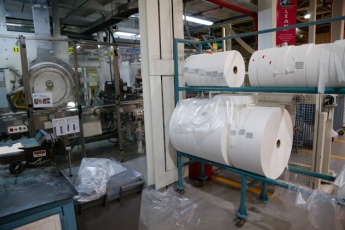 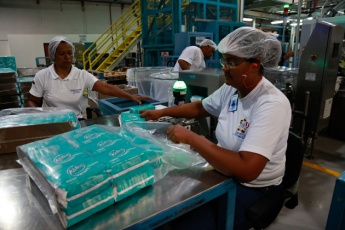
Plant operating at full production under workers' control.
In a press statement, Kimberly-Clark claimed its
difficulties
accessing raw materials and U.S. dollars for imports were the
reason for the closure. Several other firms -- including
Bridgestone, General Mills, and Procter & Gamble -- have made
similar claims and scaled back operations in Venezuela in recent
months.
Venezuelan
Industry
Minister
Miguel
Pérez
Abad
confirmed
on
July
15
that
warehouses
belonging
to
Kimberly-Clark
Corporation
were found to be
full of raw materials, despite the factory owners' insistence that they
could not produce goods.
"Kimberly-Clark
will
continue
producing
for
all
Venezuelans
and
is
now
in
the
hands
of
the
workers,"
said Labour Minister Oswaldo Vera. Industry Minister
Perez Abad added that the factory has enough raw materials to last
until the end of the calendar year.
The president described these activities as "economic
sabotage," pointing to the vast amount of U.S. dollars they
have received from the Venezuelan state in exchange for
production or imports.
Maduro pointed out that the economic warfare waged by
transnational firms and foreign states against his government
includes the financial blockade by major banks, credit agencies,
and international financial institutions. He gave the recent
example of Citibank's decision to close the account of
Venezuela's Central Bank (BCV).
"With no warning, Citibank says that in 30 days it will
close
the Central Bank and the Bank of Venezuela's accounts," Maduro
said in a speech, noting that the government uses the U.S. bank
for a range of international transactions. Venezuela faces U.S.$8.3
billion in bond payments due later this year, which
international creditors have refused to renegotiate.
"Do you think they're going to stop us with a financial
blockade? ... No one stops Venezuela," said Maduro.
In February, Venezuela defied expectations by making
U.S.$1.5 billion payment on the state oil company PDVSA's bonds.
Over the last four months, the price of Venezuelan oil
has
steadily rallied from an historic low of U.S.$24 a barrel in
February, reaching an average of nearly $40 a barrel in June.
Venezuela's
economy is highly reliant on crude oil exports.

Special Report: Hunger in Venezuela?
A Look Beyond the
Spin
- Christina Schiavoni and William
Camacaro, Food
First* -
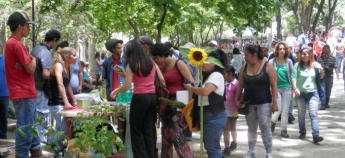
Local food vendors at market in Caracas, Venezuela.
You may have seen the headlines about Venezuela --
headlines that allude to food scarcity, rioting, people eating
stray animals to survive, and a country on the brink of
starvation. These stories are not only alarming, but perplexing,
too. Is this the same country that was recognized by the UN Food
and Agriculture Organization (FAO) as recently as 2015 for having
nearly eradicated hunger?[1]
Is this the same country that has been the
focus of international delegations and extensive alternative
media coverage for its 'food sovereignty experiment' involving
agrarian reform, food distribution programs, and direct citizen
participation in the food system?[2]
What's going on?
There is a nuanced story behind the current headlines
on
Venezuela. It's a challenging moment for average working class
Venezuelans as they navigate long lines at the grocery store, a
lack of key food staples, and inflated prices in order to feed
their families.
But there's not an overall food shortage -- food is in
abundance, with distribution serving a bottleneck.
There are numerous explanations coming from both
government
and citizens. What is driving the current 'scarcity amidst
abundance' in Venezuela? How did the present situation come to
be? How dire is it, and what are the responses coming from
communities, social movements, and the government? To what extent
is the present situation being distorted in the media, and why?
This article attempts to delve behind the headlines to address
these questions.
A Petroleum Economy and a Food System in the Balance
For nearly a century, Venezuela's economy has centered
around oil, which accounts for the vast majority of its foreign
earnings -- over 95% at present -- and national budget.[3] Since the 1930s, the
orientation
towards petroleum also meant a shift away from agriculture, which
came with a massive price tag. As both the state and private
capital withdrew from the countryside, Venezuela's peasant
farmers and rural workers could no longer earn a living. Many
flocked to Caracas and other urban hubs in search of work, making
Venezuela one of the most urbanized countries in Latin America,
with upwards of 90% of its population living in cities
today.[4] It also
became
the first country in the region to be a net importer of food, as
it was cheaper to import food with petroleum dollars than to
produce it.[5] Such
conditions facilitated development of a powerful food import and
distribution complex, controlled by national and international
corporate conglomerates.
|
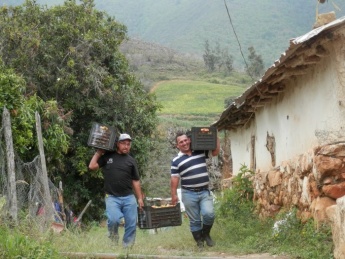
Members of a Venezuelan commune
carrying produce for market.
|
As a producer of a high demand commodity and a voracious
consumer of food imports, Venezuela became firmly inserted into
the global economy in ways that have rendered it particularly
vulnerable to fluctuations in global oil and food prices and to
domestic inflation. The companies responsible for food imports
and distribution have been able to use these conditions to their
advantage in certain ways. For instance, since 1983, when the
Venezuelan bolivar suffered a sharp devaluation against the US
dollar, driving up inflation, a common practice has been to align
product prices with black market currency rates as opposed to
official (regulated) currency rates, further fueling inflation in
the process.[6]
Venezuela's ability to import food through oil earnings
in
the past did not mean that its population was well fed. Indeed,
the imports tended to be at prices well out of reach of the
country's poor majority. In 1989, then-President Andrés
Pérez
signed a structural adjustment deal with the International
Monetary Fund, causing abrupt surges in food and fuel prices; the
price of bread rose by over 600%.[7]
For the over 60% of the population already
living in poverty, enough was enough. Hundreds of thousands of
people poured into Caracas from surrounding impoverished hillside
communities, protesting in the streets and looting shops. The
government responded to this massive mobilization by ordering the
military to open fire on the protesters. The official death toll
was 276 civilians, with actual deaths estimated to be much
higher.
Efforts Toward Change
At the beginning of Venezuela's Bolivarian Revolution
in
1999, with still over half of the population facing hunger and
poverty, both the government and citizens identified food
production and provisioning as strategic priorities -- and
significant strides have been made in the years since. On the
production end, the state has made substantial reinvestments in
agriculture, including an agrarian reform process to redistribute
large landholdings and support small- and mid-scale farmers and
fishers. On the distribution end, strategies have included
increased availability of basic food items at subsidized and
regulated prices and provision of free meals via school and
workplace programs as well as community-based feeding sites.
These efforts have made historic gains in food
security, as
recognized by FAO, but they are mainly [isolated] projects rather
than systemic shifts. That is, even with domestic production
reinvigorated and the population better fed, the country's
powerful longstanding food import and distribution complex has
remained largely unaltered. Today, Venezuela's food and medicine
supply is mostly controlled by twenty companies,[8] and one of these, Polar, is
responsible for eight of the items in Venezuela's basic food
basket, according to the Minister of Agriculture.[9] For instance, Polar is
responsible
for 62% of the market for pre-cooked corn flour used for corn
patties, called arepas, that form an essential part of the
Venezuelan diet.[10]
Scarcity Amidst Abundance?
What is going on in Venezuela today? While periodic
food
shortages are nothing new, particularly at politically heightened
moments, for more than three years the country has experienced
ongoing shortages of particular basic food products in addition
to shortages of medicines and personal hygiene items such as
soap, toilet paper, menstrual supplies, and diapers. It is the
particularity of the missing items that is essential -- and often
overlooked or distorted in media reports. There is no overall
shortage of food and other basic goods in Venezuela. What is
missing from supermarket shelves are particular essential items,
while others are in abundance. There is a lack of milk, while
dairy products such as yogurt and cheese are available. There is
a lack of pre-cooked corn flour, while other corn-based products
such as porridge are available. There is a lack of coffee,
another Venezuelan essential, while teas, hot chocolate, and
other hot beverage mixes abound. The plot thickens when one
leaves the supermarket and goes out into the streets. Prepared
coffee is available on every street corner, and in every cafe.
Areperas selling arepas with all sorts of fillings are
ubiquitous.
Why, then, are essential items missing from supermarket
shelves? The two most common arguments of the distribution
companies are that a) the regulated prices set by the government
to ensure accessibility are too low, providing a disincentive to
distributors and b) with the plummeting of oil prices,
insufficient dollars are available for import of necessary
primary materials. When Venezuelan economist and Universidad
Simón Bolívar professor Pasqualina Curcio put these
claims to the
test in her extensive investigation of the country's current
economic situation, she had some interesting findings.[11] First, several of the
missing
products have not been regulated since 2010, and among those that
are regulated, the government has raised prices in an effort to
incentivize distributors several times recently, but this has not
resulted in increased availability. Second, the shortages began
to intensify in 2013, before oil prices plummeted and while
dollars were still readily available. Even once oil prices
dropped and dollars became less available, the government
continued to prioritize dollars for food import, and by their own
accounting, the production levels of Venezuela's major food
companies have been stable or have even increased in that time.
Curcio also found a correlation between intensity of food
shortages and politically important moments, such as the lead-up
to elections. Could it be that the shortages are manufactured?
Many food sovereignty activists see it as no coincidence that
Polar, the country's largest food company, responsible for many
of the items missing from shelves, is owned by a well-known
member of the political opposition to the government.
Regardless of what is driving the shortages, there is
no
doubt they are taking a toll on the population. For most people,
the only ways to access basic products are to wait in extremely
long lines when and where they are available -- and it is important
to note that this task falls disproportionately upon women.
Another option is to buy basic products as contraband on the
street through the parallel market, where they are sold at
exponentially inflated prices. Here it bears emphasis again that
the shortages are of specific products, so other food remains
available. For instance, Venezuela is largely self-sufficient in
fruits, vegetables and root crops, which are mostly produced by
small- and mid-scale farmers. As these are distributed through
decentralized networks, they have for the most part been
unaffected by the shortages and are abundant in street markets
around the country. However, as people substitute available
products for unavailable ones (e.g., cassava, potatoes, and
plantains in place of corn flour, pasta, and other processed
carbohydrates), increased demand, together with high inflation
and speculation, is driving up food prices overall, both in shops
and on the streets. The result is an immensely challenging and
stressful situation for most Venezuelans as they strive to feed
their families.
A Look at Impacts
Beyond the psychological and economic impacts of the
shortages, lines, and high prices, what are the physical effects?
How are levels of hunger and nutrition being impacted? Here we
will share both what we know and don't know. What we do know is
that based on the most recent food intake statistics available at
the end of 2015, Venezuelans were consuming a daily average of
3,092 calories, which is well above the FAO's recommendation of
2,720 for food security, but down from 2011 when average
consumption was 3,221 calories.[12]
|
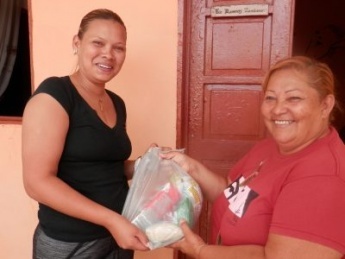
Local food and distribution networks (CLAPs) coordinate with government
to organize distribution of food to those who need it.
|
There are several reflections to be made. First,
averages do
not tell us about impacts on the most vulnerable populations. The
flip side, however, is that Venezuela has a host of social
programs specifically targeted at most vulnerable populations,
which has likely contributed to keeping the caloric averages
high. Second, averages also do not tell us anything about food
quality. Some argue current conditions are driving people toward
more limited and less healthy dietary options, while others argue
just the opposite -- that as processed options are less available,
people are opting for more nutritious whole foods as
replacements. Likely there is some of both happening, and data is
not yet available to tell us much more. Finally, in the months
since these statistics were released, shortages and price
inflation have both intensified. Data is not yet available to
tell us if average caloric intake has dropped further, but
anecdotal evidence suggests that it likely has. According to the
National Institute of Nutrition, however, the situation is being
carefully monitored and Venezuelans' caloric intake as a whole
continues to remain well above the recommended minimum.
The bottom line? Indeed, people are having a harder
time
accessing food right now in Venezuela. The situation is serious
and needs to be addressed urgently. Is Venezuela in the midst of
a humanitarian crisis? No, not according to Venezuela's
Department of Health, international authorities such as the FAO,
or our own observations and numerous interviews with community
organizers and citizens. Are people eating dogs? We recently
asked people in working class rural and urban communities in six
different states about this rumor; a common response, after
initial shock, was "well, hot dogs, sure " And rioting? So far
riots have been isolated incidents and disproportionately in
opposition-led areas, although the situation merits close
monitoring and further investigation.[13]
Why, then, the extreme media distortion? Here it is
important
to look at the broader picture. While the media is painting a
desperate situation in Venezuela, the opposition-controlled
national assembly is calling for the ousting of President Maduro
and the US is calling to extend economic sanctions. Both are
using the "humanitarian crisis" as justification -- and the media is
reflecting these claims rather than the much more complex reality
on the ground.[14]
Responses
While the government can still do more in its campaign
to
root out corruption in both the private and public sectors as
well as implement further reforms in the currency exchange
system, it certainly has not been sitting back in the face of the
shortages. On the contrary, both the government and communities
are taking the situation seriously, ramping up existing social
protections while piloting new approaches. Among the latter are
Local Provisioning and Production Committees, known as CLAPs,
which have rapidly formed across the country in recent months.
CLAPs are partnerships between grassroots organizations and the
government to provide an alternative food distribution network in
all 24 states. CLAPs have a twofold purpose. In the immediate
term, they are working to combat lines, shortages, and
speculation by delivering basic food products directly to people.
The government purchases goods directly from both private and
state enterprises, which the CLAPs distribute house to house
based on community censuses. The project is seen as a temporary
stop-gap solution to the current shortages, aimed at the most
vulnerable fifth of the population. In the longer term, CLAPs are
also intended to engage in local food production and processing.
In tandem is a major push for urban agriculture, overseen by a
newly formed Ministry of Urban Agriculture. A recent hundred-day
planting campaign involving 29,000 urban productive spaces
throughout the country aims to increase the amount of fresh
produce, eggs, fish, and animal protein available
locally.[15] These
efforts
are complemented by a renewed push for production in the
countryside.
Meanwhile, social movements are seizing the moment to
forge
deeper transformation toward food sovereignty. Driven by
necessity, unprecedented numbers of people are engaging and
re-engaging in agriculture, from community farms to backyard
patios, and in the process, exchanging seeds, bartering goods,
and creating new local enterprises. A reduced supply of
industrial agriculture inputs is also driving a transition toward
organic practices and agroecology, in what some are likening to
Cuba's special period. The shortages are also causing a shift
from processed foods and a renewed appreciation of local foods
and traditional foodways. Many activists see these developments
as elements of a new food system, a project they have been trying
to advance for many years.
This transformative vision is reflected in the
country's
newly adopted seed law, pushed forward by social movements, which
bans GMOs while protecting locally-produced seeds of Venezuela's
peasant, Indigenous, and Afro-descendent communities.[16] It is also reflected in the
Feria Conuqera, a highly popular monthly alternative market held
in Caracas, featuring agroecological and artisanal alternatives
to many of the products missing from supermarket shelves, from
arepa mixes made from plantains, cassava, and fresh corn, to
homemade soaps, deodorants, and other basic goods. Plan Pueblo a
Pueblo, a grassroots project to forge direct people-to-people
links between urban and rural communities, is also having
success: in just over a year, this initiative has reached more
than 40,000 urban families with affordable fresh foods while
working to build a new food system across the urban-rural divide.
A key mechanism enabling this effort to expand so rapidly is that
it works through already established citizen-led social
institutions known as comunas.
According
to
food
activist
Gabriel
Gil,
"the
current
crisis
is
pushing
us
to
organize
--
and the comunas
are key
vehicles for doing so."
Questioning the Headlines
While hunger anywhere deserves high-level media
coverage, it
bears asking why Venezuela, a country which, by many indicators,
has made important advances against hunger and poverty, is being
targeted daily for dire coverage that does not reflect reality on
the ground. Furthermore, why are the challenges being covered
(albeit in a distorted manner), but not the many innovative and
successful responses, from an explosion of urban agriculture, to
an agroecological transition, to unprecedented levels of citizen
organization around food production and provisioning? The answers
to this are multifold, complex, and subject to different
perspectives and interpretations, but we hope readers are
encouraged to seek out more information before taking current
news reports at face value.
Notes
1. FAO (2015) 'Venezuela and FAO
create SANA, a new cooperation programme to
eliminate hunger.'
2. Schiavoni, C. (2015) "The
Venezuelan Food Sovereignty Experiment."
3. Lander, E. (2014) "Venezuela:
Terminal crisis of the rentier petro-state model?"
4. Wilpert, G. (2006) 'Land for People
Not for Profit in Venezuela,' Rosset, P. Patel, R. and M.
Courville, eds., Promised Land,
249-264.
Oakland,
CA:
Food
First
Books.
5. Ibid.
6. Boza, T. (2014) La
Guerra
contra
el
Pueblo:
Reflexiones
para
el
Contraataque
Popular. Maracaibo:
Fundación Construyendo Ciudadanía.
7. Hardy, C. (2007). Cowboy
in
Caracas:
A
North
American's
Memoir
of
Venezuela's
Democratic
Revolution.
Willimantic, CT: Curbstone Books.
8. Curcio, P. (2016). "Apenas 20
empresas controlan la oferta de alimentos y medicinas en el
país."
9. Edgard, R. (2016) "Los Clap: El
resuelve de los pobres."
10. Curcio, P. (2016). "Apenas 20
empresas controlan la oferta de alimentos y medicinas en el
país."
11. Personal communication with Pasqualina Curcio on 23
June 2016. Also see:
Curcio, P. (2016) "Los CLAP'S: ¿camino para la paz
económica?"
12. Personal communication with National Nutrition
Institute representatives
on 27 June 2015. See also "Memoria y Cuenta 2015, Ministerio del
Poder Popular para la Alimentación (MINPPAL) -- Tomo I."
13. Misión Verdad (2016) "Cartografía
de los saqueos: actores, tácticas y métodos."
14. See here.
Also,
for
a
news
clip
(in
Spanish)
of
former
commander
of
US
Southern
Command
John
Kelly
saying
that
the
US
would
consider intervening in Venezuela to avert a "humanitarian
crisis" involving lack of food and water, see minute 3 of this video
by
CNN.
15. See here.
16. Camacaro, W., Mills, F. and C. Schiavoni (2016)
"Venezuela Passes Law Banning GMOs, by Popular Demand."
* Food First, also known as
the Institute for Food and
Development Policy, is a nonprofit organization based in Oakland,
California, USA. Founded in 1975 by Frances Moore Lappé and
Joseph Collins, it describes itself as a "people's think tank and
education-for-action centre".
Food First believes that
world hunger is not an inevitable phenomenon that occurs simply because
there is not enough food produced worldwide. Instead, it argues that
there is an enormous surplus of food produced by corporate
agri-businesses based in wealthy developed nations. Essentially, this
enormous surplus of food is a reflection of broader global inequalities
that deeply impact and harm marginalized third-world countries
worldwide. While challenging the myth that world hunger exists because
there is simply not enough food produced or available, Food First's
executive director Eric Holz-Gimenez and expert on the world food
system Raj Patel explain that, "according to the FAO, with record grain
harvests in 2007, there was more than enough food in the world to feed
everyone -- at least 1.5 times current demand."
Food First strongly opposes
the policies of institutions such as the World Trade Organization,
World Bank, and International Monetary Fund. It also played an active
role in the campaign against the proposed Free Trade Area of the
Americas.

Reports of Attacks Against Food Distribution
Trucks Increase
in Venezuela
- Jeanette Charles -
 Venezuelan media outlet Últimas
Noticias
reported
July 14 that in the last three months there have been 18
robberies along the country's Central Regional Highway,
negatively affecting national food distribution. The recent surge
in attacks against producers and their distributors are allegedly
carried out by bachaqueros, buyers and re-sellers of food as well
as other products, in addition to organized gangs. Venezuelan media outlet Últimas
Noticias
reported
July 14 that in the last three months there have been 18
robberies along the country's Central Regional Highway,
negatively affecting national food distribution. The recent surge
in attacks against producers and their distributors are allegedly
carried out by bachaqueros, buyers and re-sellers of food as well
as other products, in addition to organized gangs.
The Bolivarian National Guard (GNB) post in
Tazón, Caracas
officially documented the 18 robberies and five unsuccessful
attempts against trucks carrying vegetables and fruits along the
Central Regional Highway. In 2015, four trucks were the victims
of robberies between September and December representing a
significant spike in attacks.
Community Council "The Breeze" from Miranda State
researched
bachaqueo networks in their own sector, Rebirth. Their study
found that, "they [bachaqueros] have two trucks where they stock
the food. They sell this food to informal workers and these
[workers] re-sell the goods to the people of Ocumare del
Tuy."
Arelis Prado, representative of the Collective
"Awakening
2021" from Minas de Baruta has worked with national producers
from Tachira State to deliver and distribute vegetables in their
community. However, constant attacks along roads have caused
delays he expressed.
"The first time the truck carried 150 bags of five
kilos of
different vegetables and fruits. They tried to rob the truck when
it passed through Aragua State. They [the producers] decided to
return and come two days later," he explained.
Not only have local networks been targeted but also
government initiatives such as the Sardine Caravan coming out of
Sucre state.
Enio Aguilera, an owner of a truck that was wrecked
during an
attack, reported that seven vehicles were damaged on their way to
the Socialist Fish Fair with the Sardine Caravan. "It was direct
sabotage because we could not transport the fish to other parts
of the country in the following days," he explained.
Likewise, reports of damaged trucks and slashed tires
but
untouched and unstolen food have arisen indicating that
intimidation and not only re-selling are among the reasons behind
attacks.
"The cruelty they show toward Sucre state is because we
are
the state with the greatest fish production and we are solving
part of the food crisis due to the economic war," said
Aguilera.
Both of these former cases have been reported to the
Socialist Fishing and Agricultural Institute (Insopesca) which
has assumed part of the repair costs and is currently carrying
out an investigation regarding the incidents.
Last month, 400 people were arrested in Cumaná,
Sucre for
ransacking local stores out of frustrations with the current
economic situation and inaccessibility of certain goods. Since
then, the government has signed agreements with Trinidad and
Tobago to provide food and other basic goods to locations across
the country, including the Caribbean coastal state.
The national government continues to search for answers
to
resolve the ongoing issues facing the country's producers and
distribution networks.
Vice president Aristóbulo Istúriz said
earlier this year
that, "[farmers] cannot produce in the countryside if there is
insecurity. We will give special attention to the countryside in
regard to all the work we are doing. This is a security issue
that the State must resolve."
The Venezuelan government has implemented several
strategies
to address the country's access to food. Recent commercial
agreements with neighboring countries along with local food
distribution networks, known as CLAPs, have formed.
This week, President Nicolás Maduro also
confirmed the
creation of the Great Sovereign and Secure Supply Mission, a
national program targeted at promoting agricultural, industrial,
and pharmaceutical production.
The government is also trying to crack down on
bachaqueo
networks and corruption. Last week, 21 people were arrested in
Mérida State, along the border with Colombia, for allegedly
participating in a bachaqueo network confirmed Venezuelan
Secretary General Gerardo Molina.

Note to Our Readers
Publication
of
TML Weekly will be
irregular during the remainder of July and August. Please confinue to
send articles, reports and photos.
Thanking
you very much for your support.
With best wishes,
TML Editorial and Technical Staff
Supplement
80th Anniversary of the Spanish Civil War
|
|

PREVIOUS
ISSUES | HOME
Website: www.cpcml.ca
Email: editor@cpcml.ca
|



 The situation is extremely
serious. The government
relies
upon brute force, outside any judicial orders (even though they
invoke laws in their speeches). It is urgent to establish a
negotiating table with the Coordinadora Nacional de Trabajadores
de la Educación (CNTE) [teachers' union], with the aim of
analyzing in public the true reach of the administrative and
labour reforms which have been imposed on the teachers, and to
advance towards true education reforms and not punitive measures.
This is the root cause of the legitimate struggle of the teachers
belonging to the CNTE. This struggle must lead to immediate
freedom for the imprisoned teachers, re-hiring of those who have
been fired and the payment of overdue salaries and normalization
of the treatment of those who defend education which is public,
general and free.
The situation is extremely
serious. The government
relies
upon brute force, outside any judicial orders (even though they
invoke laws in their speeches). It is urgent to establish a
negotiating table with the Coordinadora Nacional de Trabajadores
de la Educación (CNTE) [teachers' union], with the aim of
analyzing in public the true reach of the administrative and
labour reforms which have been imposed on the teachers, and to
advance towards true education reforms and not punitive measures.
This is the root cause of the legitimate struggle of the teachers
belonging to the CNTE. This struggle must lead to immediate
freedom for the imprisoned teachers, re-hiring of those who have
been fired and the payment of overdue salaries and normalization
of the treatment of those who defend education which is public,
general and free.



 Venezuelan media outlet Últimas
Noticias
reported
July 14 that in the last three months there have been 18
robberies along the country's Central Regional Highway,
negatively affecting national food distribution. The recent surge
in attacks against producers and their distributors are allegedly
carried out by bachaqueros, buyers and re-sellers of food as well
as other products, in addition to organized gangs.
Venezuelan media outlet Últimas
Noticias
reported
July 14 that in the last three months there have been 18
robberies along the country's Central Regional Highway,
negatively affecting national food distribution. The recent surge
in attacks against producers and their distributors are allegedly
carried out by bachaqueros, buyers and re-sellers of food as well
as other products, in addition to organized gangs.




 Ten days later at NATO's Warsaw
Summit, Canada
announced a significant increase in the number of forces deployed to
Eastern Europe and the Baltic states. This includes leading a battalion
in Latvia and an increased naval and air force presence to harass and
provoke Russia on land, in the air and on water.
Ten days later at NATO's Warsaw
Summit, Canada
announced a significant increase in the number of forces deployed to
Eastern Europe and the Baltic states. This includes leading a battalion
in Latvia and an increased naval and air force presence to harass and
provoke Russia on land, in the air and on water.










